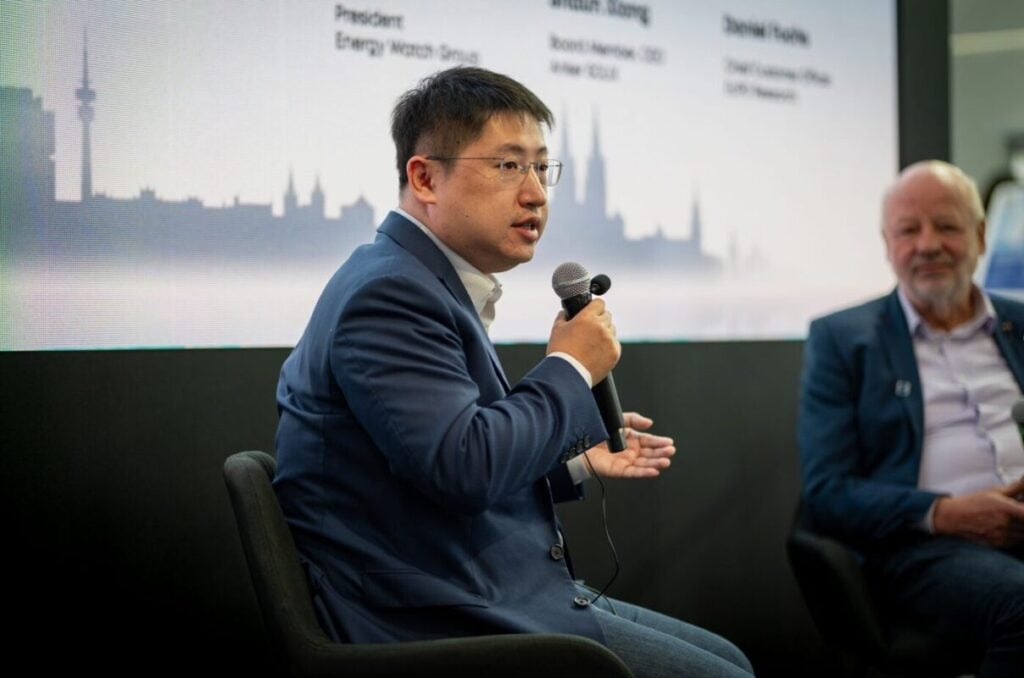
Participating at the 2025 edition of Intersolar Europe in Munich, Anker SOLIX hosted a roundtable, bringing together leading voices from across the renewable energy ecosystem to address one of today’s most critical challenges: accelerating the green energy transition and making sustainable power accessible for every household.
Kicking off the discussion, Daniel Fuchs, Chief Customer Officer at EUPD Research, presented a landmark collaborative study between Anker SOLIX and his organization, systematically analyzing Germany’s balcony solar storage segment, including trends, drivers, barriers and economic viability. Findings revealed that balcony solar storage is rapidly emerging as one of the most effective, accessible energy solutions for European homes. A typical household adopting a 2kW balcony PV system paired with 2kWh of battery storage can easily reduce over 64% of its electricity expenses, underlining Anker SOLIX’s leadership as the world’s number one plug-and-play balcony solar battery storage brand.
Panelists, including Energy Watch Group President Hans-Josef Fell, co-author of Germany’s Renewable Energy Sources Act (EEG), and Shaun Xiong, Anker Board Member and CEO, examined the current state, challenges and policy environment of Europe’s residential energy transition.
Despite the European Union’s ambitious targets to reduce carbon emissions by 55% from 1990 levels by 2030 and reach carbon neutrality by 2050, the transition’s progress remains below expectations. In 2023, the EU allocated over €60 billion in green energy subsidies, yet residential PV and storage system installations grew by only 12%.
While strong EU policies and significant subsidies exist, inefficiencies in policy execution, high fiscal burdens and risks associated with subsidy reduction threaten long-term progress. For example, Germany’s energy transition alone has cost over €500 billion, straining public finances across member states.
The fragmented, multilayered supply chain (“manufacturer → distributor → installer → consumer”) is another factor which drives up consumer costs and slows installation. Installer acquisition costs can take up 35% of their revenue, while coordination among stakeholders is inefficient. Supply chain delays mean that an average installation can take more than two months.
Despite 72% of European households expressing willingness to pay a premium for green energy, actual installation rates sit at just 18%. High upfront costs (with traditional storage system investment often exceeding €12,000 and payback periods spanning 10–15 years), lengthy and complex installation processes, and unsatisfactory product performance hinder wider adoption—resulting in Europe’s household storage market penetration remaining below 3% (Statista, Energy Transition Hub, YouGov 2023).
By shifting to a direct-to-consumer (DTC) approach, Anker SOLIX streamlines the supply chain—reducing costs, providing end-to-end service, and educating consumers directly, shortening their decision cycle and boosting marketing efficiency.
The company delivers full-scenario home energy solutions—from outdoor to residential and from entry to professional levels. The plug-and-play balcony solar storage systems (<800W systems requiring no professional installation, and >800W supported by installer networks) can be set up in under 2 hours. The latest Solarbank 3 offers PV input of up to 3,600W, compared to 800W-2,400W for previous generations, with dynamic pricing options helping users maximize annual electricity savings (up to €1,566/year and a payback period as short as 3 years).
